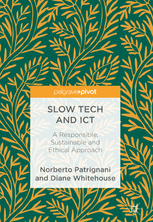
Slow Tech and ICT – A Responsible, Sustainable and Ethical Approach (recensione libro)
“Cari lettori, le tecnologie dell’informazione e della comunicazione (ICT) stanno distruggendo la vita delle persone.” Questo è il modo in cui gli autori introducono il libro: nessuno spazio per eventuali interpretazioni errate, il messaggio è forte e chiaro. Ma non sono luddisti o tecno-scettici: propongono una profonda riflessione sul design e l’uso delle ICT centrate sull’uomo. Gli autori propongono un approccio all’ICT responsabile, sostenibile ed etico o, in altre parole, buono, pulito ed equo. Riconoscono i pensatori ispiratori, come Carlo Petrini, fondatore del Movimento Slow Food che contrasta l’ascesa del fast food e della vita veloce e si concentra sul rapporto tra cibo e ambiente, Alexander Langer con la sua riflessione su un nuovo concetto di benessere, basato su uno stile di vita più lento, più profondo e più dolce e la necessità di un cambiamento ecologico che può aver luogo solo se diventa socialmente desiderabile e René von Schomberg che, in quanto policy maker dell’UE, lavora per un’innovazione responsabile socialmente desiderabile, inclusiva e ambientale sostenibile. Le TIC sono buone se mettono gli esseri umani al centro a partire dai loro bisogni e usando un approccio interdisciplinare in base al quale umanista e tecnologo lavorano insieme. È pulito se si prende in considerazione l’impatto sull’ambiente, vale a dire la scarsità di metalli delle terre rare, i consumi energetici dei grandi mega centri e il riciclaggio dei rifiuti elettronici. Infine, è giusto che i diritti umani e la salute e la sicurezza dei lavoratori siano rispettati lungo tutta la catena del valore. Anche per l’istruzione, una buona TIC è importante: il web offre enormi opportunità per migliorare l’accesso alle conoscenze, ma è importante che gli insegnanti aiutino gli studenti a coltivare un modo più profondo di scrivere e parlare e diventare capaci di interagire con strutture complesse, in termini di linguaggio e pensando Gli esseri umani hanno bisogno di tempo per pensare, meditare e discutere: essere in una “modalità di input sempre attivo” può portare a diventare obiettivi passivi dei messaggi e facilmente manipolabili. Questo libro è pubblicato da Palgrave Macmillan con ISBN: 978-3-319-68943-
{:}{:gb}
“Dear Readers, Information and Communication Technology (ICT) is disrupting people’s lives.” This is the way the authors introduce the book: no space for any misinterpretation, the message is strong and clear. But they are not luddites or techno-sceptics: they propose a deep reflection on the design and the use of human centred ICT. The authors propose an approach to ICT that is responsible, sustainable and ethical or in other words, good, clean and fair. They recognise inspirational thinkers, such as Carlo Petrini, founder of the Slow Food Movement that counters the rise of fast food and fast life and focuses on the relationship between food and environment, Alexander Langer with his reflection on a new concept of well-being, based on a lifestyle that is slower, deeper and sweeter and the need for ecological change that can take place only if it becomes socially desirable and René von Schomberg who as an EU policy maker, works for responsible innovation that is socially desirable, inclusive and environmentally sustainable. ICT is good if it puts human beings in the centre starting from their needs and using an interdisciplinary approach whereby humanist and technologist work together. It is clean if the impact on the environment is taken into account, namely the scarcity of rare-earth metal, the energy consumptions of cloud mega centres and the recycling of e-waste. Finally, it is fairif human rights and the health and the safety of workers are respected throughout the value chain. Also for education, good ICT is important: the web provides huge opportunities to improve access to knowledge, but it’s important that teachers help students to cultivate a deeper way of writing and speaking and to become able to interact with complex structures, in terms of language and thinking. Human beings need time to think, meditate and argue: to be in an ‘always-on input mode’ can lead to them becoming passive targets of messages and easily manipulated. This book is published by Palgrave Macmillan with ISBN: 978-3-319-68943-
{:}